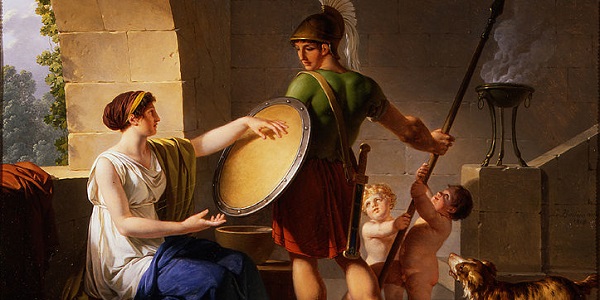
March 17, 2015, by Oliver Thomas
Charting the Spartan Mirage
Dr Philip Davies discusses the intellectual background to a conference on Plutarch and Sparta, to be held in Nottingham on 31 March.
At the core of any research on Sparta lies a peculiar methodological dilemma. Sparta is one of the most renowned of the ancient Greek city-states, and after its defeat of Athens in the Peloponnesian War (431-404) was for a period the dominant Greek power. Yet, despite its historical significance, very little writing from Sparta survives.
What we do have are accounts by non-Spartan writers. These sources provide an outsider perspective which is by turns idealising and hostile, and which in various ways colours our impression of Spartan society. In particular, they focus upon Sparta’s most exceptional aspects. The distorted image of Sparta which results is commonly called ‘the Spartan mirage’. Every student of Sparta grapples with the question of how this mirage shapes and mis-shapes our conception of Spartan society, and how we might seek to penetrate it.
The non-Spartan sources which contribute to the mirage form a sizeable list. They include contemporaries who directly experienced the Sparta about which they wrote: as an enemy, like the Athenian strategos Thucydides, or as a friend, like the Athenian exile and sometime mercenary Xenophon. However, some of our sources are separated from classical Sparta by both geography and time.
Plutarch lived c. 45-120 AD. Although he did some travelling, his base was his hometown of Chaeronea in central Greece. There, he established a prodigious name for himself as an intellectual and a writer on diverse themes. In particular, Plutarch’s five biographies of distinguished Spartans (Lycurgus, Lysander, Agesilaus, Agis, Cleomenes) and collections of Spartan sayings mean that he has arguably contributed more than any other ancient author to our popular conception of Sparta.
Yet Plutarch lived 500 years after the classical Spartan heyday on which he concentrates, and his writings are deeply embedded within the Spartan mirage. His idealised vision of Sparta was not helped by experience of the Sparta of his own time, a tourist attraction which made a superficial claim to continuity with its glorious forebear.
However, as with all of our ‘outsider’ sources, whatever distortions Plutarch’s presentation of Spartan society may contain, he remains a vital source for Sparta and Spartan history. At the same time, that presentation is in itself valuable as an example of the reception of Sparta within antiquity.
The difficulty lies in discerning between the mirage and the reality. For this endeavour, a wider understanding of Plutarch’s writings is vital, just as an understanding of Sparta’s significant place within Plutarch’s thought is important for broader assessments of him as a writer and intellectual.
On 31 March the University of Nottingham and the Centre for Spartan and Peloponnesian Studies will be hosting a colloquium dedicated to Plutarch & Sparta. Scholars from the UK and abroad will come together to hear and discuss seven exciting papers, some by literary specialists on Plutarch, some by historical specialists on Sparta. It promises to be a very rewarding day, which will highlight the ways in which a deeper and more nuanced understanding of Plutarch’s own perspective on Sparta allows us to develop a better understanding of Plutarch and his writings, of the reception of Sparta, and of Sparta ‘beyond the mirage’.
You can find more details about the colloquium, including how to register, here.
Image: Jean-Jacques François Le Barbier, Une Lacédémonienne donnant un bouclier à son fils (1806), via Wikimedia Commons. A Spartan mother instructs her son to come back either with his shield or on it – a story preserved in Plutarch’s Sayings of Spartan Women.
No comments yet, fill out a comment to be the first

Leave a Reply